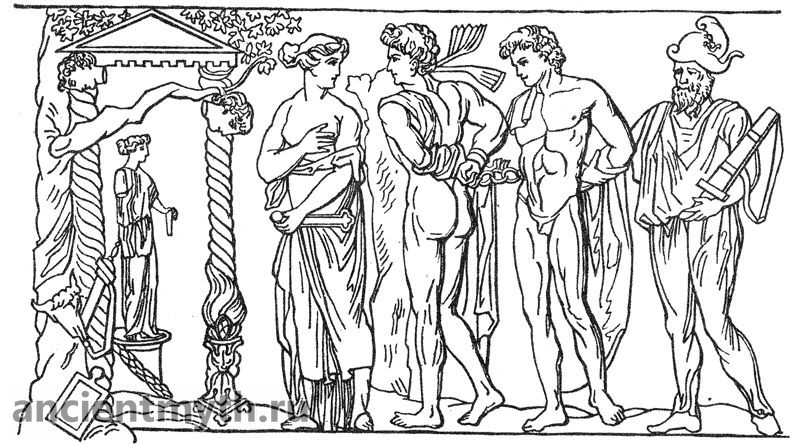Orestes goes to Tauris for the sacred image of Artemis
Orestes did not get rid of the persecution of Erinius. Not all of them obeyed the decision of the Areopagus. Some of them still pursued Orestes, not giving him rest day or night. Finally, exhausted by suffering, Orestes again fled to Delphi in the sanctuary of Apollo. There, Apollo ordered him to go to distant Taurida and bring back the sacred image of the goddess Artemis. It was a dangerous feat. The tribe of Taurians, who lived in Taurida, sacrificed before this image all the strangers who came to them. Orestes could have suffered such a fate.

(Bas-relief, late 2nd century BC)
Nevertheless, Orest set off on a long journey. Whatever the cost, Orestes wanted to get rid of the persecution of Erinyes. After a happy voyage, he arrived with his friend Pylades in Taurida and, hiding his ship among the coastal rocks, went to the temple of Artemis. Orestes did not even suspect that the priestess in this temple was his sister Iphigenia, whom the Greeks once wanted to sacrifice to the goddess Artemis. Orestes and Pylades did not dare to steal the image of Artemis during the day and began to wait for nightfall. But the shepherds saw them, attacked them, and after a long struggle tied them up and brought them to the king. The king decided that both of them should be sacrificed to Artemis.
In the morning they were led bound to the temple. Iphigenia, suspecting nothing, was supposed to kill her brother with her own hand. At night she had a terrible dream that the earthquake destroyed her father's palace, and only one column remained, from which blond curls descended, she washed the column, as if preparing to sacrifice it. Iphigenia decided that her brother Orestes had died, and she decided to make a sacrifice in honor of the deceased brother. During the sacrifice, the servants of the king brought Orestes and Pylades bound to her. She began to ask them who they were and where they came from. When she learned that they were Greeks, she asked them about the fate of Agamemnon and about her brother Orestes. Orestes and Pylades could tell a little joyful.
Finally, Iphigenia decided to sacrifice only one of the young men, and send the other with a letter to Orestes in Greece, so that Orestes knew that his sister Iphigenia was alive. It was only then that brother and sister met. Orestes and Iphigenia rejoiced at their meeting. But how were they to be saved? How to escape from Taurida?
I decided to resort to Iphigenia's deception. She announced to the king of the Taurians that the statue of Artemis was defiled and that both her and the sacrifice to the goddess, two strangers, should be washed in the sea. The king of the Taurians agreed to this.
In a solemn procession, Iphigenia went with the servants of the temple to the seashore to the place where the ship of Orestes was hidden. The servants carried the image of Artemis, and the servants of the king led the bound Orestes and Pylades. Arriving at the seashore, Iphigenia ordered the king's servants to leave, since they were not supposed to see the secret rites of ablution. When the servants left, Iphigenia freed her brother and his faithful friend and hurried with them to the ship. It seemed suspicious to the servants of the king that the ceremony lasted so long. They went to the shore and, to their surprise, they saw a ship on which Orestes wanted to take Iphigenia away. The king's servants rushed to Orestes to wrest their priestess from him. A battle began, but Orestes and Piladus put the royal servants to flight. Orestes ascended with Iphigenia and his companions to the ship. The rowers sat on the oars and went out to the open sea. But they were not destined to leave Tauris so easily.
A terrible storm arose and washed the ship ashore again. All the Greeks who were on the ship would have died, falling into the power of the king of the Taurians, if the goddess Athena-Pallas had not come to their aid. She, having appeared to the king of the Taurians, ordered him to release to Greece not only Iphigenia, her brother and all their companions, but even all the servants of the temple of Artemis. The king submitted to the will of the goddess. Now Iphigenia could return to her homeland, from where the goddess Artemis once transferred her to the Taurus.
It was a happy return voyage of Orestes. Returning to his homeland, he killed his son Aegisthus, Alet, who seized the throne in his absence . To his faithful friend Pylades, who was ready to die for him in Tauris under the sacrificial knife of Iphigenia, Orestes gave his sister Electra as his wife. Iphigenia became a priestess of the goddess Artemis in a temple built on the seashore in Attica, not far from Athens.